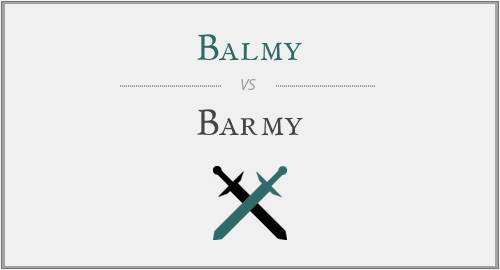Barmy and balmy sound exactly alike, and with the exception of one word (r in barmy and l in balmy) their spellings are very much similar too. The meanings of both the words however is not similar at all and the words are not interchangeable with each other. This makes them a confusable pair of words known as homophones (i.e. words that spell and sound alike but have different meanings). Many writers and learners of English language mistake balmy for barmy or vice versa due to the close association between their spellings and this is very normal. If you do not know what this pair of words means or how to differentiate between them, keep reading. This article will discuss the meanings, usage, examples and difference of the two words.
Origin:
Barmy originated in late 15th century (in the sense ‘frothy’), from barm + y that means the froth on fermenting malt liquor. Balmy’s origin is not known. The roots of both of these words goes back to the 1500s, when “balm” first was utilized to denote a soothing ointment and “barm” first described froth from fermented yeast. Their noun forms evolved into adjectives over time.
Barmy as adjective:
Barmy is used as an adjective in English language where is describes a noun. It usually refers to something or someone that is mad or crazy. I thought I was going barmy at first. Something that is extremely foolish or nonsensical, it is called barmy.
Giving up the custody was a barmy decision on your behalf.
Another sense in which barmy is used is to describe something containing barm, i.e. froth from fermented yeast.
I love this barmy malt.
Barmy is fairly common in the U.K. and elsewhere outside North America, but it’s rare in the U.S. and Canada.
Balmy as adjective:
Balmy is also used as an adjective in English language where it implies the meaning of a mild, pleasant and warm weather. It has synonyms like mild, gentle, temperate, summery, calm, tranquil, clement, fine, pleasant, benign and soothing etc.
The children and adults equally cherish the balmy days of late summer.

Another sense in which balmy is used is when describing something that produces balm i.e. froth from fermented yeast.
The barley is famous for its balmy texture.
Examples:
Though highs will soar into the balmy 80s on Friday afternoon (along with a slight reduction in frizz-inducing humidity of recent days), north winds kick in on Friday evening. [Wall Street Journal]
The jury is still out on whether this is going to prove a great leap of logical thinking or barmy reverse engineering. [Irish Times]
If you thought balmier spring weather had taken hold, think again. Quebec, Ontario and northern New Brunswick are being battered by snow, ice and intense winds. [CBC]
We are mugs to put up with these people who inflict us with their barmy interpretation of the law. [Telegraph]
Mathews and Jennings fought last year on a balmy summer’s night for the British Masters lightweight title. [Liverpool Echo]
No amount of scientific garb can disguise how much of a throwback to barmier times today’s obsession with “extreme weather” really is. [The Australian]
Balmy or barmy:
Balmy means mild, soothing, and pleasant, and it’s commonly used to discuss weather whereas barmy most commonly means goofy or crazy, stemming from earlier usage of bubbling with excitement or flighty as well as filled with barm. The confusion with these two often comes from a slang variant of “balmy” in the 1800s, which was used in the sense of “weak-minded” or “idiotic.” It was at the same time that the lesser-used “barmy” started to gain a similar definition of “wacko.” The confusion of these two words came to a point that a writer in an 1896 issue of the Westminster Gazette wrote, “Should not ‘balmy’ be ‘barmy’?




Have a discussion about this article with the community:
Report Comment
We're doing our best to make sure our content is useful, accurate and safe.
If by any chance you spot an inappropriate comment while navigating through our website please use this form to let us know, and we'll take care of it shortly.
Attachment
You need to be logged in to favorite.
Log In